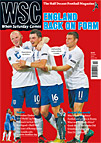 While Bosnia's national team continues to improve, their federation is under attack from fans, as James Taylor reports
While Bosnia's national team continues to improve, their federation is under attack from fans, as James Taylor reports
Late at night on September 3, after Bosnia’s victory in Luxembourg, one of the presidents of the Football Federation of Bosnia and Herzegovina (BFF), Bogdan Ceko, was attacked by unidentified assailants. This has nothing to do with safety in Luxembourg; it is an unsurprising symptom of the off-field troubles that plague Bosnian football.
The BFF has three presidents. For political reasons, each ethnic group – Bosniak (referred to in the past as Bosnian Muslim), Serb and Croat – has to be represented, with all three enjoying a World Cup junket last summer. The team was thrown into crisis in July, when FIFA declared that one president must be chosen or the team expelled.
The BFF was unable to find a solution. Fans think this reflects broader political interests. The Bosniak faction, who favour a federal Bosnia, voted for a single presidency, the Serbs, fearing a loss of autonomy to a central state, voted against and the Croats were split 50-50. Angry fans view the BFF as corrupt and joined players in a series of dramatic protests to try to force the federation out. Norway v Bosnia in 2007 was disrupted by violence and, in 2008, 19 players boycotted a home match against Azerbaijan. The protests, however, lost momentum as the violence was reported as hooliganism, and the team improved on the pitch, nearly qualifying for South Africa.
The squad’s success, which is seen as the best since the war, has caused an upsurge in pride in the Bosnian diaspora around Europe. Over 15,000 away fans attended a World Cup qualifier in Belgium and a friendly in Germany was attended by 20,000 Bosnians. As one fan observed: “Nothing good can come out of war, but at least now we have fans and players from all over Europe.”
For example, star player Zvjezdan Misimovic, an ethnic Serb, was born in Germany, played youth team football for Serbia and then switched to the Bosnian national team. Lyon’s skilful playmaker Miralem Pjanic was raised in Luxembourg and there are similar stories across the national team. On the other hand, fans lament the fact that talented Bosnians such as Vedran Corluka and Neven Subotic play for Croatia and Serbia respectively.
Reflecting Bosnian migration, fans travelled to Luxembourg from Germany, Denmark and the UK, and from as far afield as Norway, Finland and the US. But the Bosnian diaspora is nothing new. One fan group were fourth-generation Bosnian Turks, who emigrated from Bosnia in the early 20th century, after the fall of the Ottoman Empire.
Some of the fans are more proactive, notably the BHF (Bosnia Herzegovina Fanaticos), who protest against the football federation and want Bosnian football to be ethnically inclusive – they actively try to persuade other fans take down Islamic flags provocative to Croats or Serbs.
Matchday saw cautious optimism from fans. The players had earlier said they didn’t want any BFF officials to come near their camp and on the website for the Serbian section of the federation, mention of the game was conspicuous by its absence. The pre-match build-up was relaxed as Bosnian fans happily soaked up Luxembourg’s tobacco-tolerant cafe culture.
This was in contrast to the newspaper headlines of Danger, the Bosnians are coming. Luxembourg had been warned by the BFF to expect trouble – alarming in a country where violence is so rare locals have to invent it. During the World Cup, trouble kicked off with England fans in an expat bar – except it turned out they were locals wearing England tops. Bosnian fans have a war-torn past to drive fandom; affluent Luxembourg teens, in contrast, may just be bored.
The stadium was a sell-out, 90 per cent of the crowd being Bosnians, who took every opportunity to shout Savez Napolje (Federation out). Bosnia scored early and won comfortably 3-0. Luxembourg, playing in red, looked like Liverpool under Rafa Benítez, disjointed and lacking in confidence. The main stand of well-dressed Luxembourgers applauded politely and a desultory handful of Luxembourg’s self-styled “M-Block fanatics” let off the odd purple flare.
With a weak France, Bosnia are in an open group and, provided they are not thrown out by FIFA, qualification is a possibility. The talented young team is building spirit in the face of adversity. Bosnian football also has implications for the region – a successful run could see football act as a catalyst for ethnic reconciliation. Alternatively, football could be hijacked again by the nationalists whose aim is a Bosnia split on ethnic grounds. England players would do well to take note of what real pressure is.
From WSC 284 November 2010